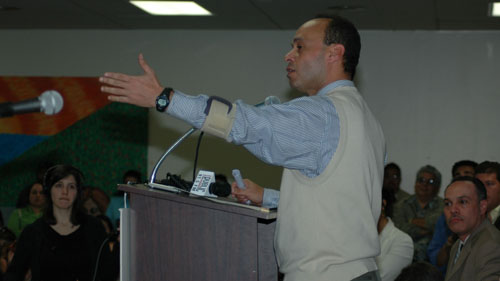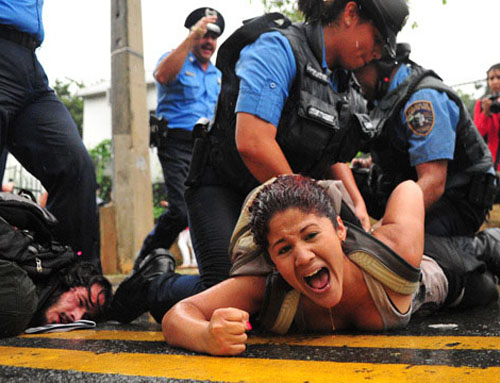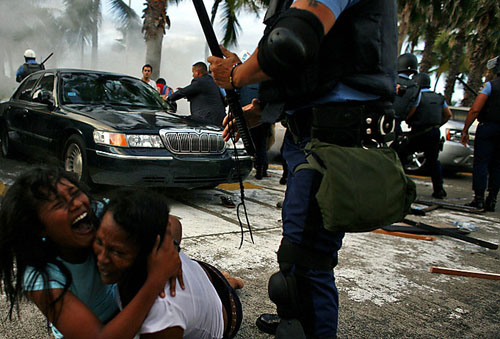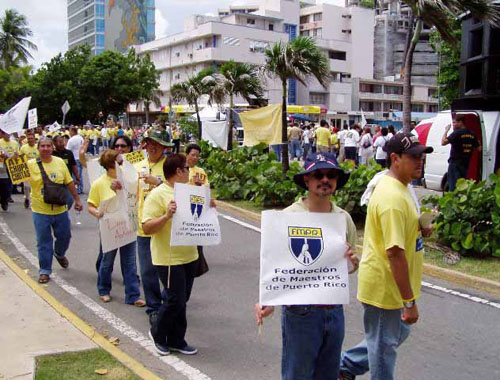While many eyes were fixed on protests in Wisconsin... Congressman Luis Gutierrez denounces repression against teachers, students, lawyers (yes, lawyers), and other protesters in Puerto Rico
[Editor's Note: The following is a speech given in the United States House of Representatives by Chicago Congressman Luis Gutierrez following the recent acts of repression against teachers, students, and other protesters in Puerto Rico. The following came via the Huffington Post. Luis Gutierrez represents the 4th Congressional District in Congress. The complete video of the speech is available on You Tube at: http://www.youtube.com/watch?v=PUy-cglbAGg for those who cannot access the hotlink above. A major report by the American Civil Liberties Union — ACLU declares Human Rights Crisis in Puerto Rico — has begun to document the repression taking place while many activists' eyes were on Wisconsin. The URL for the ACLU report for those who can't get the hotlink is: http://newstaco.com/2011/02/25/puerto-rican-student-protestors-beaten-assaulted/ ].
 Chicago Congressman Luis Gutierrez has long supported justice causes even when they do not directly involve Puerto Rico or people from Chicago's Puerto Rican community. Above, Gutierrez was one of three Illinois lawmakers to speak forcefully on behalf of immigrant rights at the April 6, 2006 meeting planning the huge May Day march of 2006 for immigrant and workers rights in Chicago. Substance photo by George N. Schmidt.On the Puerto Rican People: 'You Will Not Silence Them and You Will Not Silence Me', Rep. Luis Gutierrez , Illinois' 4th District in Chicago, Huffington Post, March 2, 2011
Chicago Congressman Luis Gutierrez has long supported justice causes even when they do not directly involve Puerto Rico or people from Chicago's Puerto Rican community. Above, Gutierrez was one of three Illinois lawmakers to speak forcefully on behalf of immigrant rights at the April 6, 2006 meeting planning the huge May Day march of 2006 for immigrant and workers rights in Chicago. Substance photo by George N. Schmidt.On the Puerto Rican People: 'You Will Not Silence Them and You Will Not Silence Me', Rep. Luis Gutierrez , Illinois' 4th District in Chicago, Huffington Post, March 2, 2011
The following is adapted from a speech by Rep. Luis V. Gutierrez, delivered this morning to the U.S. House of Representatives in Washington, D.C.
Two weeks ago I spoke about a serious problem in Puerto Rico. The problem is a systemic effort by the ruling party to deny the right of the people to speak freely, to criticize their government openly, and to make their voices heard.
[Editor's Note: One of the many videos on the most recent struggle in Puerto Rico, which began prior to the events in Wisconsin, is available at http://www.primerahora.com/milesseunencontralacuotaylainvasionpoliciacaenlaupr-474118.html]
 This photo, which was published on February 11, 2011, shows two of the recent arrests in San Juan Puerto Rico.I talked about student protests that had been met with violent resistance by Puerto Rican police. I talked about closed meetings of the legislature, and about efforts to silence the local Bar Association.
This photo, which was published on February 11, 2011, shows two of the recent arrests in San Juan Puerto Rico.I talked about student protests that had been met with violent resistance by Puerto Rican police. I talked about closed meetings of the legislature, and about efforts to silence the local Bar Association.
I was not the first to speak about it. And I could have said much more.
I could have gone into greater detail about how a federal judge -- whose picture I displayed on the floor -- jailed the head of the Puerto Rico Bar Association rather than let him disseminate information to the members of his organization.
A judge with a history of close ties to the ruling party and with a clear history opposing the Bar
Association and who was described by my good friend Charlie Rangel — after the judge handed out harsh sentencing to protesters of the bombing of Vieques — as "reminiscent of the judges we had in the U.S. in the South in the civil-rights movement who wanted to punish a community to stifle freedom of speech."
 Another scene from the January and February protests. One identification for the above photo says that it was taken following the use of tear gas and "pepper gas" against a demonstration in late January 2011 in San Juan.I could have detailed the complaints of students, legislators, the press, and the general public who were beaten and pepper sprayed by police who clearly went too far in suppressing the people's legitimate right to demonstrate. Female students who were treated with gross disrespect by the police and whose stories were captured in the searing report by the ACLU of Puerto
Another scene from the January and February protests. One identification for the above photo says that it was taken following the use of tear gas and "pepper gas" against a demonstration in late January 2011 in San Juan.I could have detailed the complaints of students, legislators, the press, and the general public who were beaten and pepper sprayed by police who clearly went too far in suppressing the people's legitimate right to demonstrate. Female students who were treated with gross disrespect by the police and whose stories were captured in the searing report by the ACLU of Puerto
Rico, "Human Rights Crisis in Puerto Rico: First Amendment Under Siege."
This was the government overreaction to demonstrations at the university over budget cuts and the layoffs of at least 17,000 and maybe as many as 34,000 public employees. And demonstrations at the Capitol over budget cuts and layoffs were also met by riot police, clubs, and more pepper spray.
The images of police tactics and behavior explain why, according to the Civil Rights Division of the U.S. Department of Justice, there is an ongoing investigation -- as we speak -- into allegations that members of the Puerto Rico Police have used "excessive force, had conducted unconstitutional searches, and acted discriminatorily."
[For those who cannot access the hotlink above, the URL is: http://www.gutierrez.house.gov/images/stories/Human_Rights_Crisis_in_Puerto_Rico_-_ACLU_Feb__14_2011.pdf]
How could you see the pictures and not speak out?
 The Federation of Puerto Rican Teachers (FMPR) has been leading the protests against the massive cuts in government services in Puerto Rico and the equally massive privatization drive. And I was hardly the first to speak out about these matters (see, for example, this statement by Mary Kay Henry, president of the Service Employees International
The Federation of Puerto Rican Teachers (FMPR) has been leading the protests against the massive cuts in government services in Puerto Rico and the equally massive privatization drive. And I was hardly the first to speak out about these matters (see, for example, this statement by Mary Kay Henry, president of the Service Employees International
Union [http://www.seiu.org/2010/07/seiu-calls-for-congressional-investigation-of-puerto-rico-riot-police-action.php] [For those who cannot access the hotlink, the URL is: http://www.seiu.org/2010/07/seiu-calls-for-congressional-investigation-of-puerto-rico-riot-police-action.php]
or this editorial from the Puerto Rico Daily Sun
[For those who cannot access the hotlink, the URL is: http://www.gutierrez.house.gov/images/stories/021011_PUERTO_RICO_DAILY_SUN_editorial.pdf]) and I will not be the last...
As a member of Congress, it is more than my right -- it is my obligation -- to speak out when fundamental freedoms are attacked.
And what was the response to my speech defending the right of the Puerto Rican people to be heard?
It was to challenge my right to be heard here in the U.S. Congress.
The resident commissioner of Puerto Rico said that only he is authorized to speak about Puerto Rico in this body.
This week the Puerto Rico legislature debated a resolution of censure -- yes, censure -- condemning me for speaking out against these abuses.
A leading member of the ruling party even said, essentially, "Gutierrez was not born in Puerto Rico. His kids weren't born in Puerto Rico. Gutierrez doesn't plan on being buried in Puerto Rico... So Gutierrez doesn't have the right to speak about Puerto Rico... "
Let me tell you something -- if you see injustice anywhere, it is not only your right but your duty to speak out about it.
We don't speak out against injustice or apartheid or human rights abuses or the denial of rights to women in places around the world because we ourselves were born there. That's silly. Where we see injustice we speak out because it is the right thing to do.
Ironically, by questioning my right to speak out on behalf of free speech, they have made my point crystal clear. By challenging my free speech, they have amplified the words of my five-minute speech more than if I had spoken for five hours.
And it is their right. My critics have the right of free speech even as they deny that same right to
others.
And I want them to understand this: Your efforts to silence me -- just like your efforts to silence so many people in Puerto Rico who disagree with you -- will fail, just as every effort to blockade progress only makes the march toward justice more powerful and swift.
I may not be Puerto Rican enough for some people, but I know this: Nowhere on earth will you find a people harder to silence than Puerto Ricans. You won't locate my love for Puerto Rico on my birth certificate or a driver's license, my children's birth certificate or any other piece of paper.
My love for Puerto Rico is right here -- in my heart -- a heart that beats with our history and our language and our heroes. A place where -- when I moved there as a teenager -- people talked and argued and debated because we care deeply about our island and our future.
That's still true today -- and that freedom is still beating in the hearts of university students, and
workers who've been fired and members of the Puerto Rico Bar Association and every person who believes in free speech. You will not silence them, and you will not silence me.
Abraham Lincoln, a leader who valued freedom above all else, said: "Those who deny freedom to others deserve it not for themselves."
It's good advice, and I hope Puerto Rican leaders take it. A video of Congressman Luis V. Gutierrez's speech to the U.S. House of Representatives:
http://www.youtube.com/watch?v=PUy-cglbAGg
Comments:
By: Jose M Lopez Sierra
Puerto Rico decolonization
Why does Puerto Rico have a higher voter turnout than USA?
Puerto Ricans have a voter turnout of about 80%. The United States (US) citizens have a voter turnout of about 50%. What accounts for this 30 % disparity? Could it be that Puerto Rican believe in democracy more than US mainland citizens?
Puerto Rico is a colony of the United States since 1898. Since that time, Puerto Ricans who have wanted to decolonize their country have been either assassinated or imprisoned. Many Puerto Ricans are terrified of independence for Puerto Rico as a result of 116 years of repression.
Since colonialism is always for exploitation, there are no opportunities in Puerto Rico for Puerto Ricans. That is why there are now more Puerto Ricans out, than in Puerto Rico. Therefore, Puerto Ricans are desperate to find a political solution to our eternal colonialism!
Most Puerto Ricans believe that decolonization can be achieved through the electoral process. But the electoral process is ultimately under the control of the government of the United States. Since the US government has ignored 33 United Nations resolutions asking it to immediately decolonize Puerto Rico, and it has maintained incarcerated Puerto Rico political prisoner Oscar L�pez Rivera for 33 years despite worldwide support to free him, there should be no doubt that the US government will never allow decolonization via the electoral process. If it were possible to do it that way, we would not have it!
The better way to decolonize is for that 80% of the Puerto Rico voter turnout to instead protest in the streets to demand our inalienable right to self-determination and independence, and insist that the UN do the decolonization in conformity to international law. After all, colonialism is within the jurisdiction of international law and never under national law. That is why it is a crime against humanity to have a colony under international law, but not so under US law.
Jos� M L�pez Sierra
www.TodosUnidosDescolonizarPR.blogspot.com
By: Jose M Lopez Sierra
Another march in NYC, June 22, 2015
The Second Oscar � Mandela March in New York City 2015
We will be having our 2nd Oscar � Mandela Protest March on Monday, June 22, 2015. We will start marching peacefully at 9 AM from Hunter College on East 68th Street and Lexington Avenue, to East 43rd Street and Lexington Avenue. We will then go East (turning left) to end up at the Ralph Bunche Park on First Avenue (across from the United Nations).
We will be at the park until 5 PM. We will be giving out flyers and talking to people about who Puerto Rican political prisoner Oscar L�pez Rivera is. We will also be educating the public about Puerto Rico�s colonial relationship with the government of the United States (US).
Most people don�t know that every year, usually on the Monday after Fathers� Day, the United Nations holds its hearing about the decolonization of Puerto Rico. The petitioners will usually join our protest after this meeting.
The UN determined in 1960 that colonialism is a crime against humanity. Since then, the UN has issued 33 resolutions asking for the US government to immediately decolonize Puerto Rico. The US government has ignored these resolutions. What kind of democracy is that?
The US government tries to keep these hearings a secret. What we are trying to do is to get them out of the closet. The UN is in its 3rd decade trying to make the world colony-free. Please help us!
Most people also don�t know that the United States government takes out 14 times more money than what it invests in Puerto Rico. But, that is what colonies are for!
This savage exploitation impedes Puerto Rico�s ability to provide opportunities for Puerto Ricans in Puerto Rico. That is why there are now more Puerto Ricans living away from Puerto Rico than in their homeland.
Oscar L�pez Rivera has been incarcerated for 34 years for his struggle to decolonize Puerto Rico. Since colonialism is an international crime, international law gives Oscar the right to use whatever means necessary to decolonize his homeland. Nelson Mandela was incarcerated for 27 years for doing the same thing as Oscar. This is why we say, Oscar L�pez Rivera is our Nelson Mandela!
United Partners for Puerto Rico Decolonization invites the public to be part of the tsunami of people that will be necessary to make the US government comply with the UN resolutions. These annual protests in Puerto Rico and at the UN are absolutely necessary, because, those who maintain colonies, don�t believe in justice for all!
Jos� M L�pez Sierra
www.TodosUnidosDescolonizarPR.blogspot.com
787-429-1981
By: Jose Lopez
Puerto Rico decolonization
US confesses to be a criminal
Those who really want to decolonize Puerto Rico should not reinvent the wheel. It is important that we use a decolonization method that the United States (US) government has the least control over, since it was the one who invaded Puerto Rico to make us its colony.
We should therefore protest peacefully and permanently for Puerto Rico decolonization, based on the 1960 United Nations (UN) resolution 1514 (XV). The UN has thus far issued 34 resolutions asking the US government to immediately decolonize Puerto Rico. The US government�s position has been that Puerto Rico is a domestic matter that is out of the jurisdiction of international law. This is obviously a lie. This is why the UN holds an annual hearing about Puerto Rico decolonization.
Resolution 1514 (XV) says that colonialism is a crime against humanity, because it is a threat to world peace. This international law gives everyone under colonialism the right to use any means necessary to decolonize one�s homeland. Therefore, President Obama�s own White House declaration that Puerto Rico is its colony, in essence is a confession that the United States government is a criminal. To make matters worse, it is an outlaw government run by a Nobel peace prize laureate. It should therefore be the US government behind bars, instead of our Puerto Rican political prisoner Oscar L�pez Rivera.
We have 4 peaceful marches and protests lined up for this year. Please join us!
1. To the Town Square with Oscar our National Hero. Oscar has been in jail for 34 years for his struggle to decolonize his homeland. Beginning on January 29th, 2016, we will congregate every 29th of the month in each of Puerto Rico�s 78 town squares, and in the diaspora to protest for his release. When Oscar is finally released, we will wait at our town squares to welcome him back home!
2. The 3rd Oscar � Mandela March in Puerto Rico 2016. On Tuesday, March 22, 2016, we will have this year�s march on the very day that we celebrate the abolition of slavery. We will march at 6 PM from the Capitol Building to the US Courthouse in Old San Juan.
3. The 3rd Independence March in Puerto Rico 2016. We will have this year�s march as usual just before the Puerto Rico UN Hearing. The date will be set as soon as we know the UN�s date for it. We will march over the Dos Hermanos Bridge into the Condado tourist area.
4. The 3rd Oscar � Mandela March in New York City. We will march again from Hunter College to the United Nations on the very day of its annual Puerto Rico decolonization hearing. This hearing is usually on the Monday after Fathers� Day.
These protests are absolutely necessary, because those who confess they are criminals don�t believe in JUSTICE FOR ALL! www.TodosUnidosDescolonizarPR.blogspot.com


By: John Whitfield
Repression in Puerto Rico
The enemy of the people is everywhere, using every measure possible to repress liberation movements, and the longing for freedom and justice of human beings. The enemy will show his club in an attempt to destroy the peoples struggle for a better world.
(comment made by Miguel Cuadra, Nicaraguense,
translated by JS Whitfield)
El enemigo de los pueblos está en todas partes, luchando y utiliizando todos los medios posibles, para reprimir los movimientos de liberación y los anhelos de justicia y libertad de los seres humanos. Donde se alcen voces demandando justicia y liberetad, el enemigo mostrará sus garras para destruir la lucha de los pueblos por un mundo mejor.